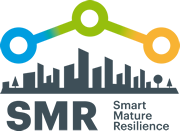Policies
Indicators
Number of cooperation agreemensts with external governmental bodies and cities
Description
At this stage, the city is already a member of a network of European cities. Now, the city becomes an active contributor to regional, national and international networks to promote initiatives, exchange experiences and learn.
Case study
INTERREG Europe: Smart Resilience for European Cities and Regions
Summary
Its main objective is improving policies for the delivery of innovation in public service applications to support and strengthen the capacity of cities and regions to prevent, resist, absorb and recover from societal and environmental risks/hazards (resilience). The project will be carried out between 2018-2022.
Further information
 Relevant city context
Relevant city context
The project is relevant to the European Territorial Cooperation programs that support the delivery of innovation by actors in regional innovation chains in areas of “smart specialisation” and innovation opportunity.
Goal: Improve policies to support cities resilience
The project's main objective is improving policies for the delivery of innovation in public service applications designed to support/strengthen the capacity of cities and regions to prevent, resist, absorb and recover from societal and environmental risks/hazards (resilience). The envisioned policy instrument focuses on enhancement of regional and national innovative systems by supporting exchanges on results achieved via R&D projects and the cooperation between regional and interregional systems, maximizing networking between public and private stakeholders. Main objectives:
- Identify and map the state of resilience against societal and environmental risks in the partner cities and regions, and the set-up of their related ecosystems;
- Create an inventory of relevant resilience practices (best and worst) in Europe;
- Define a methodological framework for benchmarking regional resilience in the context of the policy instruments addressed;
- Exchange of experience on innovation in tools and models with the potential to enhance the resilience capacity of cities and regions to best deliver innovation in public service applications;
- Identify mechanisms for transferring good practices on resilience between and within regions and cities, adapted to the different external influences (e.g. governance systems, cultural differences) and the nature of the challenges;
- Develop and monitor the implementation of action plans for improved resilience capacity, building on lessons learned from the project.
The reference tools for improvement are:
- Innovative projects (ie: best practices) for the development of new processes, aiming to stimulate exchange opportunities on qualified platforms and / or through networking between stakeholders, public and private bodies, and to gain greater funding opportunities;
- Regional innovative system through Open data/new ICT applications for e-government, to reinvigorate public policies and services and foster stakeholder engagement;
- Resilience to natural disasters and development of disaster management systems
Cooperation among stakeholders
Today, the Lazio Region shows poor relationships between SMEs and public research in the management of common innovative projects. This issue will be addressed though the multidisciplinary competences in the project: citizens, NGOs and civil society are demanding better and more specific public solutions and services to prevent disasters. In addition, there is a growing number of unaddressed issues in terms of adaptation to climate change, poverty reduction, public safety, urban planning. Specialized knowledge is needed to capture the complexity of the problems, and efforts must be undertaken in order to reduce natural risks (ie: Geo-hydrological risk and mitigation). The City of Rome, in cooperation with the Lazio Region, will focus on developing the networking among public bodies, enterprises and research institutes, supporting the delivery of innovation in resilience management, aiming at the development of innovative tools to face natural disasters, protect the natural and cultural assets. The innovation is expected to enable the dialogue between public and private stakeholders, in a holistic vision of resilience strategies, according to an Open Governance paradigm driven by open public data and services, as well as facilitate the collaboration between design, production and delivery of public services.
Outcomes
Expected outcomes of the project are:
- Development of a methodological framework to perform resilience assessment following the structure of the SMR maturity model (see: http://smr-project.eu/tools/maturity-model-guide/)
- Identification and analysis of challenges, gaps, governance systems, institutional frameworks, existing experiences, etc. – a benchmark of the territorial situation. The aim is to break down silos and identify innovation opportunities.
- Exchange of experience among the partners, based on their own experiences, as opposed to "external sources", in order to identify potentially good practices. Presentation and validation of good practices by means of workshops, seminars, study tours and site visits, possibly also peer reviews and/or user and expert panels.
Identification and analysis of best practice will be exchanged with the partners and disseminated to other interested EU regions. There will also be a validation of how the results of the interregional learning process could improve the policy instrument and support to promote and communicate the projects results. Results are expected to be a contribution to the development of a Regional Guideline based upon the lessons learned from the project – from which the policy instrument could be improved.
Resources
Total Budget: 1.698.000 €
Budget for Rome: 202.000 €
Subscribe to our newsletter

This project has received funding from the European Union’s Horizon 2020 research and innovation programme under grant agreement no. 653569.
